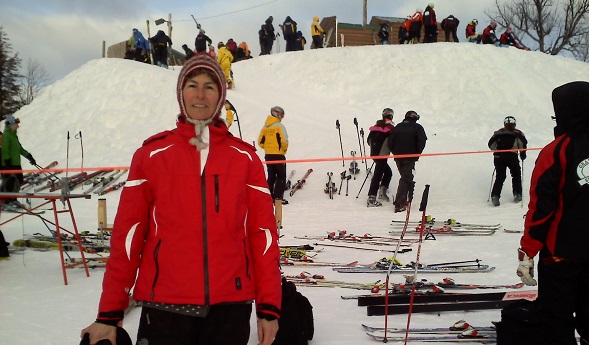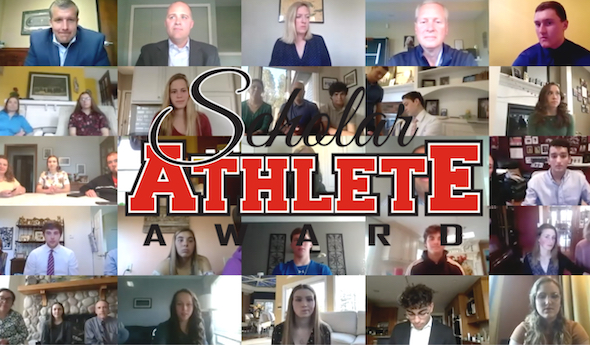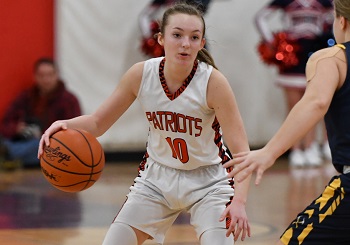
Mazzolini's Impact Felt Across Generations
By
Geoff Kimmerly
MHSAA.com senior editor
July 14, 2016
By Geoff Kimmerly
Second Half editor
A lifetime in competitive athletics has provided piles of memories for retiring MHSAA assistant director Gina Mazzolini.
 Four decades as an athlete, coach and association administrator also left her with plenty of souvenirs to sort through as she finishes her final days in the East Lansing office.
Four decades as an athlete, coach and association administrator also left her with plenty of souvenirs to sort through as she finishes her final days in the East Lansing office.
There’s a letter dated 1976 – and passed on to Mazzolini in 2004 – from the MHSAA to tennis coaches warning against stacking their lineups, an issue she’s worked to resolve over the last 20+ years.
Autographs from famous coaches John Wooden and Tom Landry made a 1991 National Federation Hall of Fame program worth saving. Just as significant was a thank-you from legendary Battle Creek St. Philip volleyball coach Sheila Guerra – who led teams to nine MHSAA titles from 1983-97 – sent in 2005 after Guerra’s daughter Vicky Groat led the Tigers to the first of what has become 10 Class D championships over the last 12 seasons.
In a number of high school sports circles, Mazzolini’s contributions are considered similarly legendary. She’s frequently been referred to as a “pioneer” – one of the first star female high school athletes from the Lansing area who went on to star at Central Michigan University and then lend her expertise to growing girls sports in this state and beyond.
“I didn’t do it because I was a woman and wanted to be the first,” Mazzolini said. “That’s just what I wanted to do, and after Title IX those jobs just opened up. And because I had some experience in coaching, officiating and playing, they took a chance on me, or they recruited me because they needed someone to run girls programs.
"I will miss people and relationships, watching things start, grow and get better.”
Mazzolini recently was recognized with a Citation from the National Federation of State High School Associations after a career that began in 1981 with Texas’ University Interscholastic League and ends after the last 23 years as an assistant director in her home state – and a mere 20 miles south of where she took the first steps toward a career that covered nearly the whole of female high school and college sports in Michigan, as a first-generation athlete and the builder of games for generations of girls and women to come.
Pioneer, indeed
Mazzolini’s senior year at St. Johns High School, 1973-74, was the first for girls basketball playoffs sponsored by the MHSAA, and Mazzolini led the Redwings to a District title that fall. She went on to star in both basketball and volleyball at CMU – still ranking among the Chippewas’ all-time hoops statistical leaders – and then to coach volleyball at Ovid-Elsie High School, Michigan State and the University of Texas.
All of that set Mazzolini up to provide a key voice and insight to rules-making bodies at the state and national levels. She’s retiring as MHSAA administrator for girls volleyball, swimming & diving, alpine skiing and tennis, and also has handled the sanctioning of out-of-state competitions and foreign exchange and international student issues. Nationally, she’s served multiple times on rules committees for soccer, swimming & diving and volleyball.
“Having worked in athletics for 46 years, I know few, if any, administrators who have a passion for excellence as does Gina Mazzolini in everything she undertakes,” wrote Marcy Weston, a retired executive associate director of athletics at CMU. “Ethics, integrity, creativity, loyalty and fortitude are just a few words that describe Gina’s work persona. And compassion, kind and supportive are words that siblings and friends access when they describe Gina.”
 Weston coached Mazzolini on the CMU volleyball team for four seasons and women’s basketball team for two. At that time, with those programs and women’s college athletics as a whole in their early stages, Mazzolini and her teammates wore the same uniforms for both sports for two years.
Weston coached Mazzolini on the CMU volleyball team for four seasons and women’s basketball team for two. At that time, with those programs and women’s college athletics as a whole in their early stages, Mazzolini and her teammates wore the same uniforms for both sports for two years.
Obviously, much has changed. And she’s played a large part.
Mazzolini first got involved as more than an athlete after taking Weston’s officiating class at CMU. Mazzolini registered as an MHSAA official – but all she knew of the MHSAA was that was where she paid her registration fee.
She still didn’t know much about state association work when offered a job at the UIL by then-executive director Bailey Marshall, who was familiar with Mazzolini because his wife Becky was the trainer for the University of Texas volleyball team when Mazzolini was an assistant coach.
“He said we’ve got to add women’s sports – they had them but not as many,” Mazzolini said. “I applied for the job and got it, and I’m still not sure what I’m going to do.”
What she lacked in initial knowledge, she made up for in passion.
Texas’ high school association at that time was adding girls tennis and soccer, beefing up some of its other offerings and reworking other sports to put females on a level playing field.
Her work there led to her first of many contributions to national rules-making committees. Early on, Mazzolini brought the perspective of someone who had played to groups that often included many who had not. She eventually chaired the volleyball committee from 2004-08 and worked with notable contributors to amateur sports including the first NCAA national coordinator of officials, Joan Powell.
“A number of people have made comments that when Gina was appointed to a national committee, the National Federation staff would breathe a sigh of relief because she would bring her patience and perspective to the table when they were forming national rules,” said MHSAA Executive Director Jack Roberts, who has served in his position since 1986.
“It’s clear to me that not just in Michigan, but across the country, there are several people who have affection for Gina as a person.”
Leaving a legacy
In addition to her recent Citation, Mazzolini is a member of the CMU Athletic Hall of Fame and received the MHSAA’s Women in Sports Leadership Award in 2010. This winter, she became the first woman to receive the MHSAA’s Charles E. Forsythe Award for her contributions to interscholastic sports.
It didn’t take long for Michigan coaches to realize she would make an impact.
 Among accomplishments she’s most proud of from her time at the MHSAA are improved relationships with the tennis and swimming communities, developed by increased communication and with the help of longtime veterans like Gary Ellis and Tiger Teusink in tennis and Denny Hill in the pool.
Among accomplishments she’s most proud of from her time at the MHSAA are improved relationships with the tennis and swimming communities, developed by increased communication and with the help of longtime veterans like Gary Ellis and Tiger Teusink in tennis and Denny Hill in the pool.
She was once told by a coach she was brave to show up at a regular-season event because of the grumbles toward the MHSAA in that sport – but soon another coach told her, “I wanted to hate you, but I like you.”
Mazzolini may choose to stick around athletics as an official, but only at the middle school level. She’ll definitely have no problems continuing to attend some of her favorite events in the sports she’s helped form over the years.
And it seems just a little coincidental that she’s stepping away from a community she’s affected so greatly at the end of the same school year that saw one of her nieces, St Johns senior Brooke Mazzolini, help the Redwings to their first MHSAA Girls Basketball Semifinal in nearly 20 years – the latest step on a path her aunt began to blaze 40 years ago, even as Gina doesn’t see herself as the “pioneer” she’s frequently made out to be.
“I played because I loved to play. I got that from my dad, and we were in an athletic neighborhood. I got into officiating and that was fun,” Mazzolini said. “And then (athletic director) Bob Forebeck at Ovid-Elsie called and said, ‘Hey I need a volleyball coach; what do you think?’ And that was a blast.
“And then I got into state associations, and I’ve really enjoyed that. There were rough patches – like when you tell people ‘no’ – but everything I’ve done, I’ve loved it. It’s hard to consider it a job, because you look forward to doing most of it.”
PHOTOS: (Top) Gina Mazzolini poses briefly while directing an MHSAA Final in skiing. (Middle) Mazzolini starred for the Central Michigan University women's basketball team. (Below) Mazzolini stands with her St. Johns high school basketball coach Beth Swears after receiving the MHSAA Women in Sports Leadership Award in 2010.

2020 Class Honored Together, from Afar
By
Geoff Kimmerly
MHSAA.com senior editor
May 15, 2020
Ishpeming Westwood’s girls basketball team was two hours into a three-hour trip to its Division 3 Regional Final on March 12 when the Patriots were told to turn the bus around and come home.
In an instant, the 2019-20 school year – and with it all MHSAA sports across the state – had come to a halt. And two months later, the high school world and its sports community continue to wait for bits of normalcy to return.
On Wednesday, we were able to enjoy a little bit of normal that’s been part of the annual MHSAA calendar for three decades. A Zoom call brought together 31 families from all over the state along with MHSAA staff and Farm Bureau Insurance CEO Don Simon to celebrate this year’s MHSAA/Farm Bureau Insurance Scholar-Athlete Award winners.
Living rooms, kitchens and home offices replaced Breslin Center as settings for this “virtual” ceremony. And yet, this ceremony may be remembered more than any other because of its necessity – due to the COVID-19 pandemic – and because of how it brought so many together, remotely, while the coronavirus has forced all of us to remain apart.
Below is the ceremony, in full, including words from Simon, MHSAA Executive Director Mark Uyl and Assistant Director Andy Frushour and, for the first time, a student speaker from the class – Ishpeming Westwood senior Madelyn Koski, who was part of that basketball team destined for Sault Ste. Marie. A brief Q&A with Koski follows.
Koski was an all-stater on the court who would’ve finished her high school career with four varsity letters each for hoops, tennis and softball. She will continue at Ferris State University, where she’ll pursue a degree in pharmacy and continue her basketball career.
Second Half: How did you decide what you wanted to say? Was there a message you wanted to get across?
It was easy to write the sad part, because I know what happened – I was there. But it was hard for me to make a positive spin at the end because I don’t think anyone’s over it yet. I was glad to be able to turn it into something that was bigger than sports … more about our whole lives and less about our time in high school.
Second Half: It’s been two months. How have you been navigating the disappointment, the sadness? And is there advice you’d give to other people your age trying to do it?
As time went on, it got a little bit better. The day after was pretty sad; that’s all I could think about. Now there’s so many other things to do – the weather’s nicer, we can go outside. And I’m playing college basketball – not everyone has that chance – but at least I have that to practice for, look forward to.
I guess, it’s just … time heals.
Second Half: Even though you can’t be with them and hang out with them, I’m sure you’re talking a lot of your friends and teammates. What kind of conversations are you having? Is it looking ahead? Is it still thinking about, “We’d be playing softball right now?"
I think we kinda tried to leave the basketball stuff in the past because it was too sad to talk about. We made sure we do talk, obviously not in person, but on social media or FaceTime, we just talk about our memories and everything. That helped. It didn’t close the chapter, but it was nice to talk to them when we were all alone. And now we just don’t talk about that anymore. Nobody really wants to talk about it. We see memories popping up on Facebook and all these other things about, “Oh, we had a softball game last year at this time.” And it’s pretty sad. But no one else is playing. So it’s like we’re all in the same boat.
 Second Half: You can turn on the news and you can see what every adult has to say about what’s going on right now. … You’re 17, you’re finishing your last year of high school, you’re going through something no one has gone through in more than 100 years. How do you see everything that’s happening in the world right now, as you look at it from a 17-year-old’s point of view and see seasons end and school end?
Second Half: You can turn on the news and you can see what every adult has to say about what’s going on right now. … You’re 17, you’re finishing your last year of high school, you’re going through something no one has gone through in more than 100 years. How do you see everything that’s happening in the world right now, as you look at it from a 17-year-old’s point of view and see seasons end and school end?
I know we can’t help what happened. But obviously I think it’s unfair that it happened to our class. It stinks for every grade, but (as seniors) we’re missing out on our best parts of high school right now and it’s pretty horrible. We’ve been waiting years for our senior proms and graduations, banquets and award ceremonies, like the MHSAA one. So that kinda stinks.
Ever since March 12, I’ve been staying optimistic. But I’m proved wrong every time because things just keep getting canceled and canceled. … (But) I’m a pretty optimistic person, so I still have some left.
Second Half: What happens next? What does your summer look like? What happens for people who are in your shoes?
I’ll keep working out, and one of the girls on my high school basketball team is going to play at Michigan Tech so (eventually) we can work out together. … I think the biggest thing to do this summer, that I think I’ll do, is appreciate time with my family. I have gotten to spend a lot of time with them. And then maybe once summer rolls around and we’re allowed to be in bigger groups, I’ll be able to be with people other than my mom and dad, like my grandparents and cousins and my aunts and uncles. … (My sister Jillian and I) have been playing the same varsity sports for the last couple of years, and she’s been really successful. It’s been fun to win all these championships and stuff with her.
Second Half: What do you think you’re going to remember from this in five years, 10 years, when people ask you what your experience was like?
I’m probably going to say it’s a pretty bad experience. I guess it was an eye-opener that life can change at any moment. That’s kind’ve it. It didn’t change in a good way.
PHOTO: Westwood's Madelyn Koski sets up a play as Negaunee's Breanne Giotto defends her during their Jan. 24 game. (Photo by Cara Kamps.)

